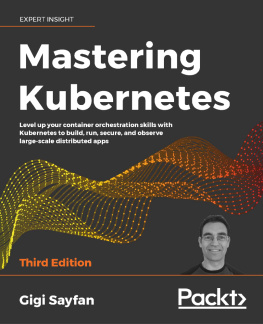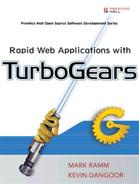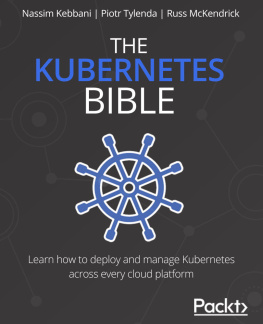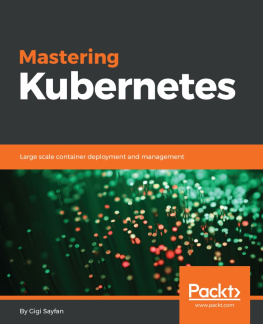Mastering Kubernetes
Third Edition
Level up your container orchestration skills with Kubernetes to build, run, secure, and observe large-scale distributed apps
Gigi Sayfan

BIRMINGHAM - MUMBAI
Mastering Kubernetes
Third Edition
Copyright 2020 Packt Publishing
All rights reserved. No part of this book may be reproduced, stored in a retrieval system, or transmitted in any form or by any means, without the prior written permission of the publisher, except in the case of brief quotations embedded in critical articles or reviews.
Every effort has been made in the preparation of this book to ensure the accuracy of the information presented. However, the information contained in this book is sold without warranty, either express or implied. Neither the author, nor Packt Publishing or its dealers and distributors, will be held liable for any damages caused or alleged to have been caused directly or indirectly by this book.
Packt Publishing has endeavored to provide trademark information about all of the companies and products mentioned in this book by the appropriate use of capitals. However, Packt Publishing cannot guarantee the accuracy of this information.
Producers: Ben Renow-Clarke, Aarthi Kumaraswamy
Acquisition Editor Peer Reviews: Suresh Jain
Content Development Editor: Kate Blackham
Technical Editor: Gaurav Gavas
Project Editor: Carol Lewis
Proofreader: Safis Editing
Indexer: Pratik Shirodkar
Presentation Designer: Sandip Tadge
First published: May 2017
Second edition: April 2018
Third edition: June 2020
Production reference: 1260620
Published by Packt Publishing Ltd.
Livery Place
35 Livery Street
Birmingham B3 2PB, UK.
ISBN 978-1-83921-125-6
www.packt.com

packt.com
Subscribe to our online digital library for full access to over 7,000 books and videos, as well as industry leading tools to help you plan your personal development and advance your career. For more information, please visit our website.
Why subscribe?
- Spend less time learning and more time coding with practical eBooks and Videos from over 4,000 industry professionals
- Learn better with Skill Plans built especially for you
- Get a free eBook or video every month
- Fully searchable for easy access to vital information
- Copy and paste, print, and bookmark content
Did you know that Packt offers eBook versions of every book published, with PDF and ePub files available? You can upgrade to the eBook version at for more details.
At www.Packt.com , you can also read a collection of free technical articles, sign up for a range of free newsletters, and receive exclusive discounts and offers on Packt books and eBooks.
Contributors
About the author
Gigi Sayfan has been developing software professionally for more than 20 years in domains as diverse as instant messaging, morphing, chip fabrication process control, embedded multimedia applications for game consoles, brain-inspired machine learning, custom browser development, web services for 3D distributed game platforms, IoT sensors, virtual reality, and genomics. He has written production code in many programming languages, such as Go, Python, C, C++, C#, Java, Delphi, JavaScript, and even Cobol and PowerBuilder for operating systems such as Windows (3.11 through 7), Linux, macOS, Lynx (embedded), and Sony PlayStation. His technical expertise includes databases, low-level networking, distributed systems, unorthodox user interfaces, DevOps, and the general software development life cycle.
Gigi is also a longtime author who has published multiple books and hundreds of technical articles and blogs.
About the reviewer
Onur Yilmaz is a senior software engineer at a multinational enterprise software company. He is a Certified Kubernetes Administrator (CKA) and works on Kubernetes and cloud management systems. He is a keen supporter of cutting-edge technologies including Docker, Kubernetes, and cloud-native applications. He is the author of multiple books, including Introduction to DevOps with Kubernetes, Kubernetes Design Patterns and Extensions, Serverless Architectures with Kubernetes, and Cloud-Native Continuous Integration and Delivery. He has one master's and two bachelor's degrees in the engineering field.
Preface
Kubernetes is an open source system that automates the deployment, scaling, and management of containerized applications. If you are running more than just a few containers or want to automate the management of your containers, you need Kubernetes. This book focuses on guiding you through the advanced management of Kubernetes clusters.
The book begins by explaining the fundamentals behind Kubernetes' architecture and covers Kubernetes' design in detail. You will discover how to run complex stateful microservices on Kubernetes, including such advanced features as horizontal pod autoscaling, rolling updates, resource quotas, and persistent storage backends. Using real-world use cases, you will explore the options for network configuration and understand how to set up, operate, secure, and troubleshoot Kubernetes clusters. Finally, you will learn about advanced topics such as custom resources, API aggregation, service meshes, and serverless computing. All the content is up to date and complies with Kubernetes 1.18. By the end of this book, you'll know everything you need to know to go from intermediate to advanced level.
Who this book is for
The book is for system administrators and developers who have intermediate-level knowledge about Kubernetes and are now waiting to master its advanced features. You should also have basic networking knowledge. This advanced-level book provides a pathway to master Kubernetes.
What this book covers
Chapter 1, Understanding Kubernetes Architecture, in this chapter, we will build together the foundation necessary to utilize Kubernetes to its full potential. We will start by understanding what Kubernetes is, what Kubernetes isn't, and what container orchestration means exactly. Then we will cover important Kubernetes concepts that will form the vocabulary we will use throughout the book.
Chapter 2, Creating Kubernetes Clusters, in this chapter, we will roll up our sleeves and build some Kubernetes clusters using minikube, KinD, and k3d. We will discuss and evaluate other tools such as Kubeadm, Kube-spray, bootkube, and stackube. We will also look into deployment environments such as local, cloud, and bare metal.
Chapter 3, High Availability and Reliability, in this chapter, we will dive into the topic of highly available clusters. This is a complicated topic. The Kubernetes project and the community haven't settled on one true way to achieve high-availability nirvana. There are many aspects to highly available Kubernetes clusters, such as ensuring that the control plane can keep functioning in the face of failures, protecting the cluster state in etcd, protecting the system's data, and recovering capacity and/or performance quickly. Different systems will have different reliability and availability requirements.









